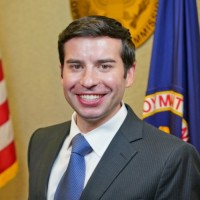“It turns out there’s going to be a president elected this year,” HR expert Tim Sackett laughed as he opened an HR Tech session featuring former U.S. EEOC Commissioner Keith Sonderling on Thursday.
Regardless of which direction the presidential election goes in November, said Sonderling—who left the EEOC last month after four years with the agency—“things will change drastically” for HR.
The Biden administration’s heavy union focus would continue under a potential Harris administration. Still, Sonderling expects Biden’s “old-school Michigan labor” focus would “take a backseat” to a concentration on civil rights issues under Kamala Harris’ leadership.
Harris—whom Sonderling noted sent a letter to his former agency while she was in the Senate inquiring about racial discrimination in video interviewing—would likely put the federal spotlight on HR issues, including pay equity, pay discrimination, pay transparency, racial and sex discrimination, and paid family leave.

A potential second Donald Trump administration would also feature “a lot of interest” in HR-related topics, though markedly different from his Democratic opponent, with a focus on the “really technical business issues.” This could include making it easier for companies to hire independent contractors without misclassification issues and easier to function in the joint employer space free of liability, for instance. The “gig economy,” Sonderling added, would be a significant driver of Trump’s business policies.
Both would continue to treat DEI as a “top” issue—Harris “fighting back against anti-DEI” sentiment and Trump opposing corporate DEI programming, which could impact not just the use of DEI principles in hiring but also the work of employee resource groups, Sonderling said.
The sharp focus on labor unions from the candidates on both sides in the presidential election represents an “unbelievable shift” that has skyrocketed White House and Congressional attention to labor issues. Coupled with a spotlight on the employer impacts of the pandemic in the last few years, Sonderling predicted that D.C. attention to employment matters won’t fade, regardless of who wins the presidential election this fall.
“Scrutiny is going to continue across the board,” Sonderling said. “This is elevated now, and that’ll continue. The [HR] practice, in general, is going to be under a microscope.”
The state of AI regulation before and after the presidential election
One issue on many HR leaders’ radars is AI regulation. While Harris would likely further the Biden administration’s efforts to center civil rights and transparency in AI regulation, “some of that” could continue under a Trump administration. However, the former president has weighed removing Biden’s executive order on AI, which Sonderling said could have a trickle-down effect on employers.
“There’s still going to be huge, bipartisan interest in AI regulation,” he predicted. “I don’t think that much is going to change. Republican or Democrat, we’re still going to see the spotlight there.”
While federal movement on AI regulation will take some time, Sonderling said, things are moving much faster at the state and local levels, making things “incredibly complicated” for employers.
To get ahead of potential regulations and stay on the right side of EEOC attention, employers using or weighing the use of AI in employment processes need to consider two basic concepts, Sonderling said: how the vendor designed the AI and how the organization uses the tool.
“Whether it’s designed improperly or used improperly, employers are going to be 100% liable for whatever decisions these tools are making,” Sonderling said.
AI-powered tools bring a significant potential for reducing discrimination in hiring. For instance, he said, AI-led interviewing removes the bias that could allow a candidate’s skin color or pregnancy status to factor into the decision-making process. However, the same tool—if it’s not properly programmed—may rank a candidate lower if it can’t understand a foreign accent.
That complexity means there is no singular “best use case of AI tech in HR,” Sonderling said. Each case and each tool must be individually evaluated based on the organization’s needs.
“It’s all about how you’re using it within HR, how you’re complying with your organization’s existing practices and how you’re removing bias instead of scaling bias,” he said. “The trickiest part is there’s no one-size-fits-all approach.”
The post Trump, Harris and AI: What will the presidential election mean for HR? appeared first on HR Executive.